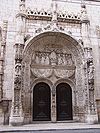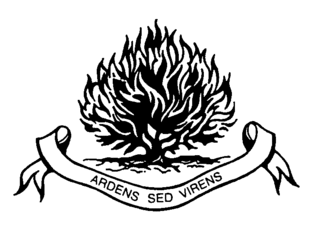
Presbyterianism is a part of the Reformed tradition within Protestantism that broke from the Roman Catholic Church in Scotland by John Knox, who was a priest at St.Giles Cathedral. It traces its origin to the Church of Scotland the Presbyterian church founded by John Knox, which is the mother church for modern day Presbyterianism. Presbyterian churches derive their name from the presbyterian form of church government by representative assemblies of elders. Many Reformed churches are organised this way, but the word Presbyterian, when capitalized, is often applied to churches that trace their roots to the Church of Scotland or to English Dissenter groups that formed during the English Civil War.
Presbyterianpolity is a method of church governance typified by the rule of assemblies of presbyters, or elders. Each local church is governed by a body of elected elders usually called the session or consistory, though other terms, such as church board, may apply. Groups of local churches are governed by a higher assembly of elders known as the presbytery or classis; presbyteries can be grouped into a synod, and presbyteries and synods nationwide often join together in a general assembly. Responsibility for conduct of church services is reserved to an ordained minister or pastor known as a teaching elder, or a minister of the word and sacrament.

The Church of Scotland is the national church in Scotland.

The Free Presbyterian Church of Scotland was formed in 1893. The Church identifies itself as the spiritual descendant of the Scottish Reformation. The Church web-site states that it is 'the constitutional heir of the historic Church of Scotland'. Its adherents are occasionally referred to as Seceders or the Wee Wee Frees. Although small, the church has congregations on five continents.

The Presbyterian Church in Canada is a Presbyterian denomination, serving in Canada under this name since 1875. The United Church of Canada claimed the right to the name from 1925 to 1939. According to the Canada 2001 Census 409,830 Canadians identify themselves as Presbyterian, that is, 1.4 percent of the population.
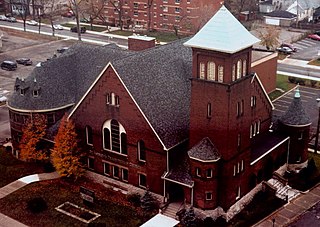
St. Andrew's Presbyterian Church, is a Presbyterian Church in Canada congregation in downtown Windsor, Ontario, Canada. The congregation dates back to 1857, and at one time, was the largest congregation by membership within the Presbyterian Church in Canada (PCC).

The Free Church of Scotland is an evangelical, Calvinist denomination in Scotland. It was historically part of the original Free Church of Scotland that remained outside the union with the United Presbyterian Church of Scotland in 1900. Now, it remains a distinct Presbyterian denomination in Scotland.
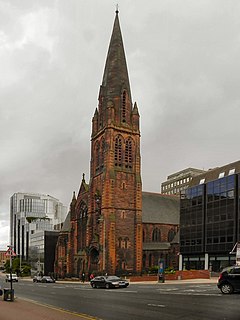
St Columba's Church is a Church of Scotland Parish church that serves a Gaelic congregation in Glasgow.
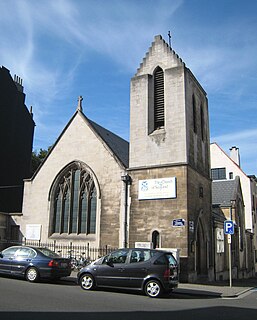
St Andrew's Church in Brussels (Ixelles) is a congregation in membership of both the Church of Scotland and the United Protestant Church in Belgium (EPUB/VPKB) Services are conducted in English. The congregation's mission statement is "We aspire to follow Jesus in bringing the knowledge of God's love to all".

Crown Church is a parish church in Inverness in the Scottish Highlands, located at the junction of Midmills Road and Kingsmills Road near the city centre. The first minister (1899–1907) was the Reverend William Todd, renowned for his fervent evangelical preaching. Originally built for the Free Church of Scotland, the church buildings were completed in 1901. By this time the congregation had become part of the United Free Church of Scotland, which in turn united with the Church of Scotland in 1929, thus reuniting Scotland's largest Presbyterian denominations.

Barclay Viewforth Church is a parish church of the Church of Scotland in the Presbytery of Edinburgh.
The International Presbytery covers the Church of Scotland's congregations in continental Europe, Sri Lanka and the Caribbean. Until 2016 it was called the Presbytery of Europe. In October 2014 it was agreed to move towards changing the name to the International Presbytery.

Hope Park Church in St Andrews, Fife is a congregation of the Church of Scotland.

The Scots Kirk, Lausanne, is a protestant, presbyterian church situated in Lausanne, avenue de Rumine 24. It is part of the Church of Scotland's Presbytery of Europe and one of two congregations of the Church of Scotland in Switzerland, the other being the Scots Kirk in Geneva. Sunday services are in English.

Abbeygreen Church is a congregation of the Free Church of Scotland in the small town of Lesmahagow, South Lanarkshire. As a Christian congregation, it is presbyterian and reformed; holding the Word of God, the Holy Bible, as the supreme rule of life and doctrine and the Westminster Confession of Faith as a sub-ordinate standard, which helps explain the doctrines of the Christian faith. Being Presbyterian, it serves as part of the Free Church of Scotland Presbytery of Glasgow and seeks to faithfully serve God in Lesmahagow and the surrounding area. Having a missional outlook it is involved with a number of missionary organizations including, but not only, UFM Worldwide and Rose of Sharon Ministries, and helps with the organization and support of the Scottish Reformed Conference.

St. Andrew's Scots Kirk, is located at 73 Galle Road, Colombo. The church was founded in the late 19th century, and prospered during the colonial and post-colonial periods. It was the centre for the Scottish community in Colombo.

St Blane's is a Church of Scotland church located in Dunblane, Scotland. The evangelical congregation is within the Church of Scotland's Presbytery of Stirling. The Gothic Revival church building opened in 1854 as the Free Church and is now a category B listed building.
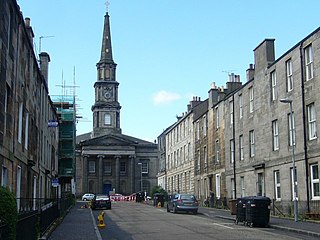
North Leith Parish Church is a congregation of the Church of Scotland, within the Presbytery of Edinburgh. It is serves part of Leith, formerly an independent burgh and since 1920 a part of the city of Edinburgh, Scotland.

St Andrew's Orthodox Church is an Orthodox church located in the Southside, Edinburgh, Scotland. Edinburgh’s Orthodox community was founded in 1948 and has, since 2013, occupied the former Buccleuch Parish Church, which was founded as a chapel of ease of St Cuthbert's in 1756 and closed in 1969.

The King's Hall is a church in Newington, Edinburgh, Scotland. Constructed as Newington Free Church in 1843, it is now used by Community Church Edinburgh: an independent evangelical congregation.



















